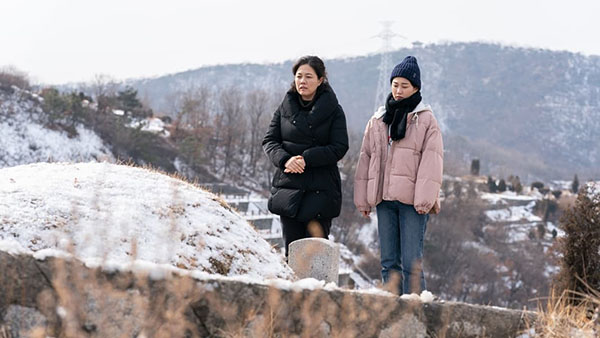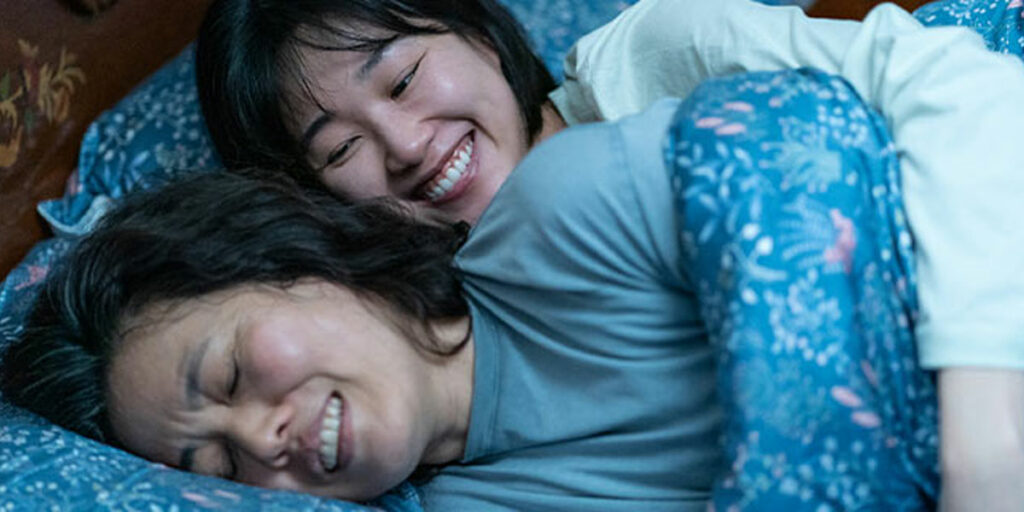A beautifully understated and quietly poignant debut, Kim Jung-eun’s Gyeong-Ah’s Daughter explores the complexities of trauma and familial relationships.
Abuse, be it past or present, physical or digital, has a habit of rippling outwards and affecting not just the immediate victim, but those closest to them as well. Kim Jung-eun’s Gyeong-ah’s Daughter (경아의 딸) is a beautifully subdued yet layered film that explores the complexities of a mother/daughter relationship, and how each participant in it is shaped by not just their own trauma, but that of the other.
Gyeong-ah (Kim Jung-Young), a care-worker, is adjusting to living alone after her daughter, Yeon-su (Ha Yoon Kyung), moves away to start her career as a teacher. Their relationship is a complicated one, as an abusive late husband/father has made Gyeong-ah very protective of her daughter and Yeon-su craving independence. Her mother’s cloying nature is exactly the reason why Yeon-su has kept her romantic life a secret, but then her ex-boyfriend leaks a private video of them online. Gyeong-ah’s initial reaction isn’t great, and it causes a significant rift between the two of them. Yeon-su must now navigate the most difficult period of her life alone while Gyeong-ah reconciles her own feelings and tries to make amends.
For a debut feature, Gyeong-ah’s Daughter feels very self-assured. The film is simultaneously tracking two narratives: one about the complexity of a mother and daughter relationship, and one about two women resolving their own personal traumas. The way in which each narrative thread overlaps speaks to director Kim Jung-eun’s understanding of her subjects, confidence in her ability to tell the story, and trust in the audience to understand that family dynamics are always more complicated that we might first assume.
At the beginning of the film, Gyeong-ah appears to be just a very overbearing mother, who abashes Yeon-su for taking taxis late at night, demands to see that she’s alone in her apartment when they video call, and whose first reaction when she confronts Yeon-su about the video is to bemoan the ways in which she has failed as a mother. She even calls Yeon-su a ‘whore’ and tells her to leave. But then, as the film progresses and we learn of the abuse Gyeong-ah suffered at the hands of her late husband, we come to understand that her behaviour has been a result of her not having fully reconciled with that past trauma, and she’s distraught to realise that she might have truly lost any semblance of relationship with Yeon-su. It also humanises her, makes her more than just a domineering ‘mother’ figure and rather a woman who makes mistakes and truly does love her daughter.

The parallels between Gyeong-ah’s physical abuse and Yeon-su’s more modern digital abuse are also really interesting, because they also highlight the generational differences in the two women. Gyeong-ah doesn’t like to talk about it and wants to keep things private, while Yeon-su actively pursues criminal charges as her privacy has been violated and an intimate moment shared without her consent. But Yeon-su is also still her mother’s daughter, and retreats in on herself and shoulders the pain, fear and embarrassment of the ordeal alone. She stops teaching in school and worries about showing her face to new students online in case they recognise her; she stops confiding in friends and ignores her mother’s attempts to reach out.
It’s a really affecting way of showing just how isolating these situations can be, but also emphasising the importance of seeking justice, healing and understanding that it is not a reflection on you. Yeon-su hides away because of her mother’s reaction, shame, and the societal instinct to blame the woman for ‘letting’ herself be recorded. Gyeong-ah reacts as she does because she carries antiquated ideas of what a young woman should be, but also out of hurt that she has forced her daughter to keep so many aspects of her life a secret from her. But the film doesn’t vilify either woman for their reactions, nor does it delve too deeply into discussions of consent, privacy violations or the alarming rate in which such videos are released. And ultimately, it doesn’t need to, because the main focus here is on the relationship between Yeon-su and her mother, which is more than compelling enough.
Gyeong-ah’s Daughter feels like an incredibly intimate and personal film. Both Kim Jung-Young and Ha Yoon Kyung give their characters so much dimension, vulnerability and resilience, and the deep connection between them is so palpable, even when they aren’t speaking to each other. The film poignantly points out how complex the relationship between a mother and a daughter can be and how it can hurt so much when they disappoint each other, whilst also emphasising the ripple effect trauma has on both the victim and those closest to them. It’s a stunning debut, and a sure sign of great things to come from Kim Jung-eun.
Gyeong-ah’s Daughter will premiere on 13 November at the 2022 London Korean Film Festival, which will run 3-17 November in cinema venues around London.

